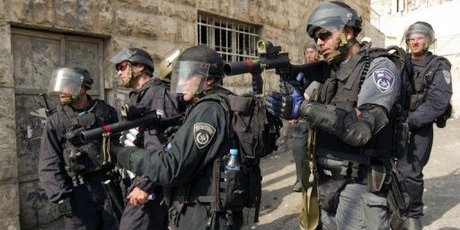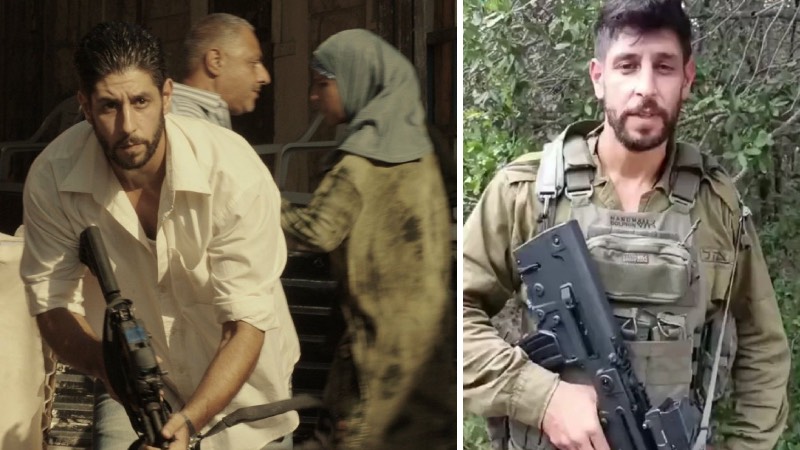Shin Bet: The Israel Security Agency
February 9, 2014

Sherut haBitachon haKlali, better known by the acronym Shabak, in English as the Israel Security Agency (ISA) or the Shin Bet (a two-letter Hebrew abbreviation of the name), is Israel’s internal security service. Its motto is “Magen VeLo Yera’e” ( “Defender that shall not be seen” or “The unseen shield”). It is one of three principal organizations of the Israeli intelligence community, alongside Aman (military intelligence) and the Mossad (foreign intelligence service). Shin Bet’s special operations unit is Yamas.
Organization
Shabak is believed to have three operational wings:
The Arab Affairs Department: responsible primarily for Arab related counter-terrorism activities in both Israel and the Palestinian Territories.
The Non Arab Affairs Department: responsible for non-Arab security issues and cooperation with foreign security agencies, previously concerned with the Communist Bloc.
The Protective Security Department: responsible for protecting high-value individuals and locations in the country such as government officials, embassies, airports, and research facilities.
Although a security agency, it is not a part of the Israeli Ministry of Defense, and its chief answers directly to the Prime Minister of Israel.
Duties and roles
Shabak’s duties are safeguarding state security, exposing terrorist rings, interrogating terror suspects, providing intelligence for counter-terrorism operations in the West Bank and the Gaza Strip, counter-espionage, personal protection of senior public officials, securing important infrastructure and government buildings, and safeguarding Israeli airlines and overseas embassies.
History
With the Israeli declaration of independence in 1948, the Shabak was founded as a branch of the Israel Defense Forces and was initially headed by Isser Harel (the father of Israeli Intelligence, who later headed the Mossad). Responsibility for Shabak activity was later moved from the IDF to the office of the prime minister. During the 1948 Arab-Israeli war, Shabak’s responsibilities included only internal security affairs. In February 1949 (a short while before the end of the war), its responsibilities were extended to counter-espionage.
One of the Shabak’s leading successes was obtaining a copy of the secret speech made by Nikita Khrushchev in 1956, in which he denounced Stalin. A Polish edition of the speech was provided to the Israeli embassy in Warsaw by the boyfriend of the secretary of a Polish communist official. The Shabak’s Polish liaison officer conveyed the copy to Israel. The Israeli government then decided to share the information with the United States, which published it with Israeli approval. On the other hand, a study published in 2013 by Matitiahu Mayzel casts doubt on the story, arguing that the speech was not secret and that it was conveyed to the West by multiple sources, including Soviet political and intelligence agencies.
A notable achievement in counter-espionage was the 1961 capture of Israel Beer, who was revealed to be a Soviet spy. Beer was a Lieutenant Colonel in the reserves, a senior security commentator and close friend of Ben-Gurion and reached high Israeli circles. Beer was tried and sentenced to ten years in prison (later extended by the Supreme Court to fifteen years, following his appeal), where he died. A year before, Kurt Sitte, a Christian German from the Sudetenland and a professor in the Technion, was revealed as a Czechoslovakian spy.
In 1967, an Egyptian-Israeli double agent, Rif’at al Gamal/Jacques Bitton, gave Egypt false information about Israel’s battle plans, claiming it would begin with ground operations. The Egyptians thus left their aircraft on open runways, which enabled the Israel Air Force to knock out Egypt’s air force within three hours of the outbreak of the Six-Day War. Operation Yated, as it was later known, is considered one of the most successful deceptions in Israeli intelligence history, on a par with Britain’s Operation Mincemeat during World War II.
After the war, monitoring terrorist activity in the West Bank and Gaza Strip become a major part of Shabak’s mission. During 1984–1986, Shabak experienced a major crisis following the Kav 300 affair in which four terrorists hijacked a bus. Two of the hijackers were killed in an ensuing standoff, the other two were killed shortly after being taken into custody by Shabak officers, who later covered up the event and conspired to frame a senior IDF officer. Following the affair, Shabak head Avraham Shalom was forced to resign.
The Landau Commission, set up to investigate Shabak interrogation methods, criticized the organization and established guidelines to regulate what forms of physical pressure could be used on prisoners.
In 1995, the Shin Bet failed to protect the Israeli prime minister, Yitzhak Rabin, who was assassinated by a right-wing Israeli radical Yigal Amir. Shin Bet had discovered Amir’s plans, and a Shin Bet agent was sent to monitor Amir, and reported that Amir was not a threat. Following the assassination, the Shabak director, Carmi Gillon, resigned preemptively. Later, the Shamgar Commission pointed to serious flaws in the personal security unit. Another source of embarrassment and criticism was the violent, provocative and inciting behavior of Avishai Raviv, an informer of the Shabak’s Jewish Unit during the time leading up to the assassination. Later, Raviv was acquitted of the charges that he encouraged Yigal Amir to kill Yitzhak Rabin.
A few months after the Rabin assassination, Hamas chief bombmaker Yahya Ayyash was assassinated in a targeted killing in which an explosive device was planted in his cellular phone.
Gillon was replaced by Israeli Navy admiral Ami Ayalon, who helped to restore the organizational morale, after the debacle of the Rabin assassination and rehabilitate its public image.
In 2000, Ayalon was replaced by Avi Dichter, an ex-Sayeret Matkal commando and an experienced Shabak agent, tightened the working relationship with the Israel Defense Forces and Israeli police. Dichter was in charge when the al-Aqsa Intifada erupted. He turned Shabak into a prominent player in the war on terrorism after the collapse of the 2000 Camp David Summit.
In November 2003, four former heads of Shin Bet (Avraham Shalom, Yaakov Peri, Carmi Gillon and Ami Ayalon) called upon the Government of Israel to reach a peace agreement with the Palestinians.
In May 2005, Dichter was replaced by Yuval Diskin.
Accountability
Former Shin Bet director special assistant Barak Ben-Zur said that since 1948 (or more particularly 1957) the group has been brought under control of the Knesset to monitor its budget. In May 2002, a landmark was set when Shin Bet was brought under the purview of the Knesset Foreign and Security Committee, which could investigate whether it is working within legal boundaries which, in turn, involves the Constitution, Law and Justice Committee is also involved. The government legal adviser approves Shin Bet activities, the Political-Security Cabinet receives reports directly from the Shin Bet director and that every detainee has the right to submit a complaint.
Information gathering and interrogation methods
Shabak also extracts information by interrogating suspects, and there is a history of concern over its methods. In 1987, after complaints about excessive use of violence, the Landau Commission drew up guidelines condoning “moderate physical pressure” when necessary, but in 1994, State Comptroller Miriam Ben-Porat found that these regulations were violated and senior GSS commanders did not prevent it. Later, in 1999, the Israeli Supreme Court heard several petitions against Shabak methods, including (1) “forceful and repeated shaking of the suspect’s upper torso, in a manner which causes the neck and head to swing rapidly,” (2) manacling of the suspect in a painful “Shabach position” for a long period of time, (3) the “frog crouch” consisting of “consecutive, periodical crouches on the tips of one’s toes,” and other methods. The Court ruled that Shabak did not have the authority, even under the defense of “necessity,” to employ such methods.
Shabak claims it now uses only psychological means, although B’Tselem and Amnesty International continue to accuse Shabak of employing physical methods that amount to torture under international conventions.
Shabak has also worked closely with the Israeli Air Force in “targeted killings” of field commanders and senior leaders of Palestinian militant factions of Hamas, the Islamic Jihad, the Al-Aqsa Martyrs Brigades, and Fatah. These killings are usually done by helicopter gunships. Both the IAF commanders and Shabak agents sit together in the command center to monitor the operation. Shabak’s task is to give intelligence about when and where the target will be available for a strike and then to react to IAF drone feedback to ensure the men at the location are indeed the correct targets.
Visibility
Once considered a commitment to lifelong anonymity and even invisibility in Israeli society, today a Shabak agent who achieves high rank in the service, especially the director, is considered a candidate for membership in the top brass of the Israeli government and business community. This process follows a trend started by ex-generals and colonels of the Israel Defense Forces, the trailblazers including Moshe Dayan, Ariel Sharon, and Yitzhak Rabin. In the Shabak and the foreign intelligence Mossad service, the trend showed up much later (during the mid-1990s), even though Isser Harel (who served as head of both services) and Meir Amit of the Mossad both served as lawmakers.
Ex-Shabak directors today are increasingly visible as candidates for higher office. Yaakov Peri became the chairman of Bank HaMizrahi in 2002, and also became a highly visible guest on television programs. Carmi Gillon serves as Chairman of the Local Council of Mevaseret Zion, a Jerusalem suburb, while Avi Dichter and Ami Ayalon were at one time leading candidates for defense minister (Dichter for the Kadima party formed by prime minister Ariel Sharon, Ayalon on the Labour party ticket). Dichter eventually became Minister of Internal Security in the government led by Ehud Olmert. Ayalon has attracted widespread following as a co-initiator with Palestinian dignitary Sari Nusseibeh of the non-governmental Peoples’ Voice initiative to petition the governments in Israel and the Palestinian Authority for a permanent settlement.
In 2007, the service launched its first ever public recruitment drive, unveiling a “slick Web site” and buying on-line ads in Israel and abroad in a campaign aimed at “attract[ing] top-tier computer programmers” to its “cutting-edge” IT division. On March 18, 2008, it was announced that Shabak’s official website would also offer a blog, where four of its agents would discuss anonymously how they were recruited, and what sort of work they perform; they would also answer questions sent in by members of the public. The decision to launch the blog was made by the Shin Bet’s top brass, including head Yuval Diskin, and is part of an attempt to attract high-tech workers to the agency’s growing IT department. According to Shabak officers, the Web site and blog are aimed also at promoting a more accessible and positive public image for the secret service, long associated with “dark, undercover and even violent activity”.
In 2012, six former heads of the Shin Bet (Shalom, Peri, Gillon, Ayalon, Dichter, and Diskin) featured in a documentary film, The Gatekeepers, and discussed the main events of their tenures.
Shin Bet directors
Isser Harel (1948–1952)
Izi Dorot (1952–1953)
Amos Manor (1953–1963)
Yossef Harmelin (1964–1974)
Avraham Ahituv (1974–1981)
Avraham Shalom (1981–1986)
Yossef Harmelin (1986–1988)
Yaakov Peri (1988–1994)
Carmi Gillon (1995–1996)
Ami Ayalon (1996–2000)
Avi Dichter (2000–2005)
Yuval Diskin (2005–2011)
Yoram Cohen (2011–)
Click here to learn all about The Mossad
Similar posts
-

Israel Has The Most Moral Military In The World
April 10, 2024In the heart of a region often riddled with conflict, Israel stands out not only for its technologi...
-

The Resilience of the Israeli People
April 2, 2024Visitors from around the world have seen Hamas's October 7th Massacre's destruction in southern Isr...
-

Israel: Small Size, Big Impact
March 21, 2024Nestled along the eastern edge of the Mediterranean Sea, Israel is a land of immense historical sig...
-

Israelis Are Fighting For Their Lives
February 21, 2024By Jonathan S. Tobin The world looks a lot different from Kibbutz Kfar Aza than it does in the U...
-

Over 2 Million Arabs Live In Israel
January 23, 2024In the complex landscape of the Middle East, where diverse cultures and identities intersect, Israe...
-

'Fauda' Star Idan Amedi Injured Fighting in Gaza
January 8, 2024Despite the severity of his injuries, Amedi's father assured Israeli news channels that his life is...
-

Israel Is A Great Country To Live In
December 28, 2023Nestled at the crossroads of the Middle East, Israel stands as a vibrant and dynamic nation, offeri...
-

Dear World: I Don't Care
November 2, 2023By Avi Lewis I don’t care that you sympathize with Hamas I know you wouldn’t tolerate any of ...




















